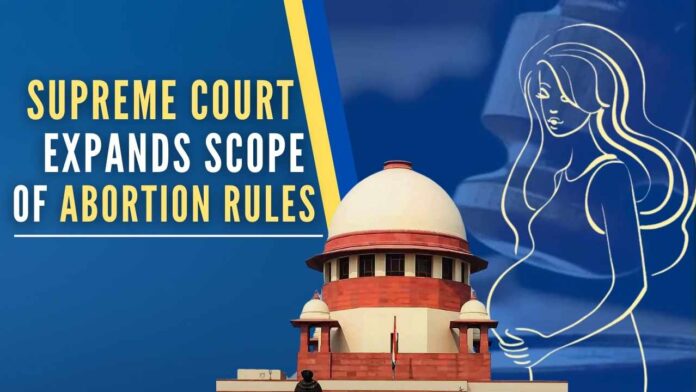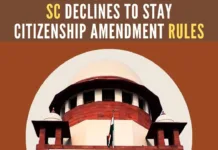
Supreme Court gives landmark judgment on abortion norms
While US Supreme Court passed a regressive judgment on abortion rules in June, India’s Supreme Court on Thursday came out with a landmark judgment on abortion norms. In a landmark verdict, the Supreme Court of India expanded the scope of the Medical Termination of Pregnancy (MTP) Act and the corresponding rules to include unmarried women for abortion between 20-24 weeks of pregnancy, saying limiting the provision to cover only married women will render it discriminatory and violative of Article 14.
The top court held the meaning of the words “sexual assault” or “rape” under the rules of the MTP Act, includes a husband’s act of sexual assault or rape committed on his wife. “The meaning of rape must therefore be understood as including marital rape, solely for the purposes of the MTP Act and any rules and regulations framed there under,” said the verdict by India’s apex court.
The court said the rights of reproductive autonomy, dignity, and privacy under Article 21 give an unmarried woman the right of choice on whether or not to bear a child, on a footing similar to a married woman. A bench of Justices D Y Chandrachud, A S Bopanna, and J B Pardiwala, said the ambit of reproductive rights is not restricted to the right of women to have or not to have children and also includes the constellation of freedoms and entitlements that enable a woman to decide freely on all matters relating to her sexual and reproductive health.
The top court’s verdict came on an appeal by a woman from the North East challenging the Delhi High Court order denying her permission to abort her pregnancy from a consensual relationship after her partner refused to marry and left her. It said the object of Section 3(2)(b) of the MTP Act read with Rule 3B is to provide for abortions between 20 and 24 weeks of pregnancy rendered unwanted due to a change in the material circumstances of women.
“In view of the object, there is no rationale for excluding unmarried or single women (who face a change in their material circumstances) from the ambit of Rule 3B. A narrow interpretation of Rule 3B, limited only to married women, would render the provision discriminatory towards unmarried women and violative of Article 14 of the Constitution”, the bench said.
It added that Article 14 requires the state to refrain from denying to any person equality before the law or equal protection of laws, and prohibiting unmarried or single pregnant women (whose pregnancies are between 20 and 24 weeks) from accessing abortion while allowing married women to access them during the same period will fall foul of the spirit guiding Article 14.
“The law should not decide the beneficiaries of a statute based on narrow patriarchal principles about what constitutes “permissible sex”, which create invidious classifications and excludes groups based on their personal circumstances. The rights of reproductive autonomy, dignity, and privacy under Article 21 give an unmarried woman the right of choice on whether or not to bear a child, on a similar footing to a married woman”, the bench said. The Bench headed by Justice Chandrachud, in a lengthy verdict of 75 pages, said the ordinary meaning of the word ‘rape’ is sexual intercourse with a person, without their consent or against their will, regardless of whether such forced intercourse occurs in the context of matrimony.
The court added that married women may also form part of the class of survivors of sexual assault or rape and a woman may become pregnant as a result of non-consensual sexual intercourse performed upon her by her husband. “We would be remiss in not recognizing that intimate partner violence is a reality and can take the form of rape. The misconception that strangers are exclusively or almost exclusively responsible for sex- and gender-based violence is a deeply regrettable one. Sex- and gender-based violence (in all its forms) within the context of the family has long formed a part of the lived experiences of scores of women”, said the judgment.
The apex court said it is not inconceivable that married women become pregnant due to their husbands having “raped” them and the nature of sexual violence and the contours of consent do not undergo a transformation when one decides to marry. “The institution of marriage does not influence the answer to the question of whether a woman has consented to sexual relations. If the woman is in an abusive relationship, she may face great difficulty in accessing medical resources or consulting doctors,” said India’s apex court judgment
There was wide criticism of the US Supreme Court’s judgment in June 2022 restricting the rights of women in abortion.[1]
Reference:
[1] Roe v Wade: What is US Supreme Court ruling on abortion? – Jun 24, 2022, BBC
PGurus is now on Telegram. Click here to join our channel and stay updated with all the latest news and views
For all the latest updates, download PGurus App.
- Subramanian Swamy approaches Supreme Court on Govt’s modification of 2G Scam Judgment to avoid auction of Satellite Spectrum - April 23, 2024
- Defence Minister Rajnath Singh visits Siachen. Reviews military preparedness - April 22, 2024
- Amit Shah’s shares in the Stock Market almost doubled in the past five years - April 21, 2024











[…] खबर को अंग्रेजी में यहाँ […]